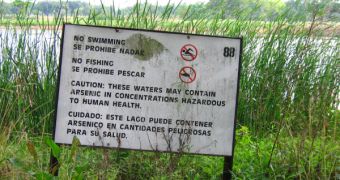One of China's most famous hot spring lakes is now critically endangered by arsenic poison. Local authorities have recently discovered the contamination and have placed an offer for the disinfection of the lake both nationally and internationally. The water reserves of a nearby town are severely affected and no one knows when the spilling started.
Thus far, investigations showed that a nearby company, dealing with dangerous chemicals, failed to contain byproducts to sealed tanks. As a direct result, dangerous arsenic, a chemical extremely hazardous to human health, has slowly infiltrated the underground waters and managed to find its way into the nearby lake. Over time, concentrations slowly rose until they were identified as posing serious public health risks.
Now, Yunnan province authorities are desperately trying to restore fresh, drinkable water to over 26,000 people, whose main water supply was the Yangzonghai lake, once famous for its springs. The bad news is that arsenic is very hard to trace without specialized equipment, because it's odorless, tasteless and colorless. It's also easy soluble in water and other liquids, which made it very feared over the years. As a poison, the chemical acts instantly, if delivered in high dosages. Smaller amounts are not lethal, but they cause people to gradually get sick and develop other afflictions.
Xinhua, a Chinese news agency, says that several hundred people already fell ill after being contaminated with residual waste in the Guangxi province, affected by poor waste management. The national government in Beijing has very little control over industrial activities that go on in remote provinces near China's borders. This also applies to economy sectors such as power production, where coal-powered plants elude central control even now.
Similar cases, of contaminated water supplies, also occur in the United States, where several lakes were accidentally polluted with a couple of dangerous chemicals. These pose significant risks to those who dare venture on the waters, despite the warning signs placed by authorities. Usually, it requires many years for waters to absorb and reduce toxin concentrations, so lakes will remain closed to any activity for the time being.

 14 DAY TRIAL //
14 DAY TRIAL //